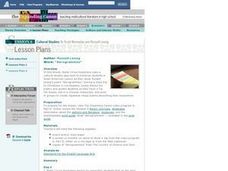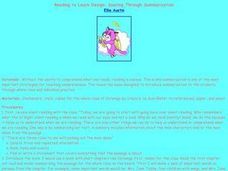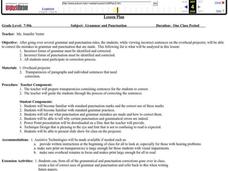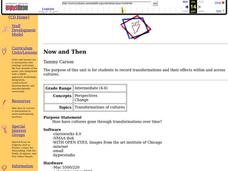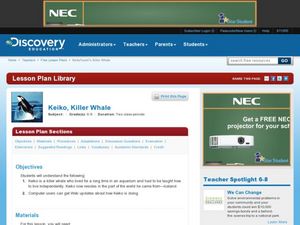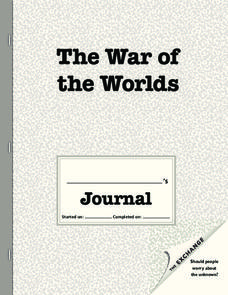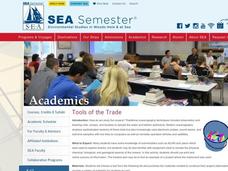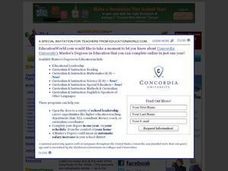Curated OER
Heritage: What Would YOU Take?
Fifth graders classify goods based on their value and decide what they would take with them if they were resettling to a new land. They write an essay defending their choices.
Curated OER
"Aerogrammes"
High schoolers examine Asian American culture through the analysis of the poem, 'Aerogrammes.' They watch a video, read and discuss the poem, take a field trip to Chinatown, and write a poem about their Chinatown experience.
Curated OER
Exploring the Food and Dining Patterns of Cameroon: Classification Activity
Students practice using new vocabulary on the dining practices of Cameroon. Using classification techniques, they put words into different categories. As a class, they review and discuss the answers.
Curated OER
Perform Accounting Functions
Students practice performing various accounting functions. Given analysis records, they prepare cost and revenue analysis based on specific criteria. They complete handouts and review their answers as a class. They also discuss the...
Curated OER
Falcon KWL Chart
Students create KWL charts about falcons. They write what they know about falcons and what they want to know about them. They read for information on falcons and complete the last column of their chart with the information they...
Curated OER
Reading to Learn Design: Soaring Through Summarization
Students are introduced to and practice techniques and strategies to master the art of summarization. They read, discuss and summarize chapter 3 in "Catwings," by Ursula K. LeGuin. Steps to follow for summarizing is included within this...
Curated OER
Learning to Read With Superman Speed
Students practice techniques to become more fluent readers by reading more proficiently and with faster speed. They stress mastery of the d=/d/, e=/e/ and de=/de/ sounds in spoken and written words. The book, "John Henry," by Julius...
Curated OER
BACTERIAL GROWTH ON FOOD
Students address the question of the value of refrigeration in keeping food (chicken) from "spoiling". They experiment with aseptic technique skills in handling sterile water and some type of quoting system.
Curated OER
Grammar and Punctuation
Students review grammar and punctuation rules from previous lessons. As a class, they work together to correct sentences on an overhead transparency. If there is a discrepancy about what needs to be changed, they must discuss the issue...
PBS
Predicting/Making a Hypothesis
As an introduction to the hypothesis and testing method of investigation, young history detectives engage in a special investigation of a family artifact. After watching a short video that demonstrates the method, they develop a...
Curated OER
Abbreviations
In this grammar learning exercise, students read and edit six sentences by correcting the abbreviations and acronyms within the sentence. Additionally, students match five abbreviations with their meaning.
PBS
Predicting/Making a Hypothesis
Students analyze information from a variety of sources in order to create a hypothesis about the origin of an interesting family artifact.They create alternative hypotheses based upon available information to demonstrate that some...
Curated OER
Two Sides, Same Coin: How Political Beliefs Influence Language Use
Learners read several magazine articles on the same topic written from different political perspectives, paying particular attention to the diction, syntax, and arguments presented in support the point of view expressed. They then select...
Curated OER
Adjectives and Adverbs: Bad and Badly
In this adjectives and adverbs worksheet, students learn the correct use of "bad" and "badly". Students correct the word usage in 10 sentences.
Curated OER
Now and Then
Students record transformations and their effects within and across cultures. Students study the life of specific people in a former time period and then in the present time period. This teacher focused on the Winnebago tribe, using her...
Curated OER
Alarm as the Clock Ticks Toward 2000
Students explore how various people and businesses are reacting to the potential technological problems that may occur when the year 2000 arrives. They read and compare two related New York Times articles and share their own views of the...
Discovery Education
Sonar & Echolocation
A well-designed, comprehensive, and attractive slide show supports direct instruction on how sonar and echolocation work. Contained within the slides are links to interactive websites and instructions for using apps on a mobile device to...
Curated OER
Keiko, Killer Whale
Middle schoolers will create a children's book on Keiko, the killer whale, that was rehabilitated and returned to the wild after living in an aquarium. In small groups, they conduct internet research to find out the history and current...
Curated OER
Tell a Ton of Tall Tales
Elementary schoolers read many tall tales. They create their own tall tale about a specific event of their choosing. They must act the part of the author. This well-designed lesson takes three class sessions to complete, and is...
Curated OER
Springfield Digital Storytelling Project #6: Grapes Commercial
Here is a fabulous instructional activity that should have your class very excited! They utilize the GRAPES formula in order to produce a commercial like ones we see on TV. Working in pairs, they must come up with a script, take video,...
Curated OER
The War of the Worlds
Read The War of the Worlds with your class. Then you can enhance the reading experience through the use of these worksheets. Keeping track of reading, recording reader response, and various activities pertaining to the book are included....
Curated OER
Tools of the Trade
Students construct functional replicas of oceanographic tools and demonstrate and explain their use.
Curated OER
Gold Rush California and its Diverse Population
Students compare contemporary cultural differences with historical differences based on population percentage. In this cross-curriculum Gold Rush/math lesson plan, students analyze aspects of California's Gold Rush population and...
Curated OER
Investigating Brass Instruments and Pitch
Students observe the sounds of different brass instruments in order to understand how to create different pitches. In this musical lesson, students create a "brass" instrument from everyday household objects. The students discuss the...



